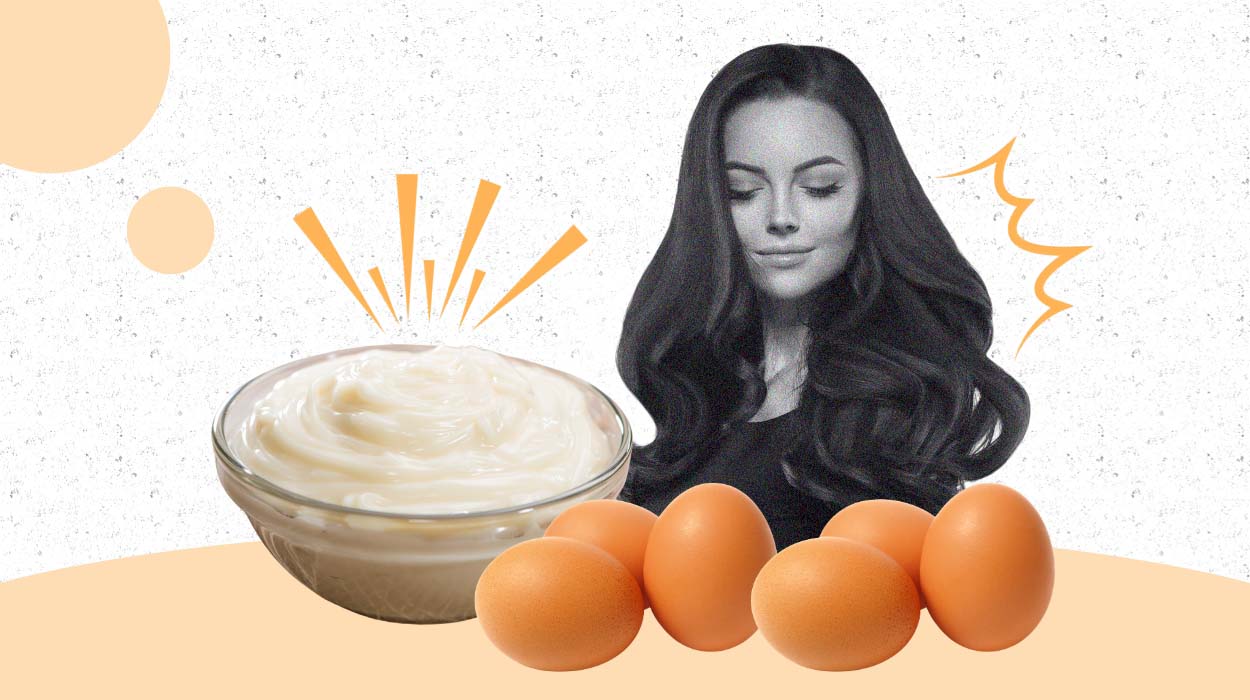 Expert's opinion
Expert's opinion
Expert's opinion
The article is a subjective view on this topic written by writers specializing in medical writing.
It may reflect on a personal journey surrounding struggles with an illness or medical condition, involve product comparisons, diet considerations, or other health-related opinions.
Although the view is entirely that of the writer, it is based on academic experiences and scientific research they have conducted; it is fact-checked by a team of degreed medical experts, and validated by sources attached to the article.
The numbers in parenthesis (1,2,3) will take you to clickable links to related scientific papers.
Is Mayonnaise Good For Your Hair? Here’s The Truth 2024

There’s no shortage of home remedies and DIY treatments to keep your locks looking their best. While some might sound crazy, we have to wonder if they actually work. So we’re diving into the science to find out — is mayonnaise good for your hair?
Mayonnaise is a mixture of oil, egg yolk, and vinegar. The oil in mayonnaise offers moisture and nourishment, which promotes hair growth. Meanwhile, the proteins in egg yolk helps to strengthen the hair shaft and, in turn, minimize breakage. Given all these nutrients, some people have found mayonnaise an effective hair conditioner and treatment.
This article gives all the information you need on the benefits, side effects, and how to use mayonnaise in your hair care routine.
Is Mayonnaise Good For Your Hair?
Yes, mayonnaise can indeed provide some benefits for your hair. But, like most hair masks, it’s not an overnight miracle cure.
The proteins, fats, and oils present in mayonnaise can help nourish dry, damaged hair, leaving it looking healthier and shinier. But, using mayonnaise regularly may not suit everyone’s hair type.
Mayonnaise Ingredients
Before getting into whether mayonnaise is good for your hair, let’s look at the ingredients. Mayonnaise is mainly made of:
- Oil (usually soybean or canola oil).
- Egg yolks.
- Vinegar or lemon juice.
- Salt.
- Sugar.
The first ingredient, oil, is known to have nourishing properties, which may improve your hair’s texture and appearance. Oils, such as soybean oil, are often used in hair care products because they can provide essential fatty acids, vitamins, and antioxidants.
Egg yolks, on the other hand, contain proteins that can potentially repair damaged hair or prevent hair breakage. Plus, egg yolks[1] are a good source of vitamins A, D, and E, which can help maintain hair health[2] and vitality.
Vinegar or lemon juice adds an acidic property to the mayonnaise, which could help balance your hair’s pH level. A balanced pH[3] can promote hair growth and reduce breakage. Moreover, vinegar is known to have antimicrobial properties that may help with hair and scalp health.
As for salt and sugar, these ingredients don’t have significant effects that improve hair health.
So, now that you have a better understanding of the ingredients in mayonnaise, it seems that there might be some benefits to using it on your hair. But keep in mind that results may vary based on individual hair types. It’s essential to consult a hair care professional or do a patch test before trying new remedies on your hair.
Benefits Of Mayonnaise For Hair
Mayonnaise can benefit your hair in several ways:
Repairs And Nourishes
One of the primary benefits of using mayo on hair is its ability to help repair damaged strands. The oils and fats[4] in mayonnaise can penetrate the hair shaft, nourishing it from within and leaving it soft, smooth, and shiny. This is particularly helpful for those who have dry and damaged hair.
Detangles And Makes Hair Easier To Manage
Another advantage of using a mayonnaise hair conditioner is that it can help detangle your hair, making it easier to manage. The slippery texture of mayonnaise allows the comb to glide through your hair, reducing breakage and frizz.
Helps Growth And Maintenance
An egg and mayo hair mask may provide additional advantages, such as being beneficial for both hair growth and maintenance. Eggs contain proteins and nutrients essential for hair health,[5] such as vitamins A, E, biotin, and folate.
To summarize, the benefits of using mayonnaise for hair care include:
- Repairing damaged hair.
- Moisturizing and nourishing hair.
- Detangling and reducing frizz.
- Supporting hair growth and health.
When considering whether mayo is good for your hair, remember that these benefits are based on anecdotal evidence, and scientific research is limited. But it’s worth trying a mayonnaise hair treatment if you’re looking for a conventional and cost-effective solution to hair issues. However, remember that results may vary from person to person.
Side Effects Of Mayonnaise On Hair
It’s also important to know some potential side effects before lathering mayo onto your scalp.
One consequence of using mayonnaise for hair is the risk of an allergic reaction — especially if you’re sensitive to any of its ingredients, such as eggs, vinegar, or oil. If you’re unsure, it’s best to perform a patch test on a small section of your skin to ensure no adverse reaction.
Another drawback is the smell that may linger even after you’ve rinsed your hair. The odor of mayonnaise can be quite strong, and it may require more than one wash to get rid of the scent completely.
Mayonnaise is also heavy and greasy, so it could weigh down your hair or make it feel oily if you use too much. This is especially relevant if you have thin or fine hair. The product could cause your hair to become flat and unmanageable.
In conclusion, while using mayonnaise for hair might have some benefits, it’s important to be mindful of the potential side effects associated with it. Try exploring alternative hair care products that are specifically designed for your hair type and needs for the best results.
How To Use Mayonnaise For Hair Care Routine
Creating a mayonnaise mask for your hair is one of the best ways to add it to your hair care routine. You’ll need the following:
- 1/2 cup of full-fat mayonnaise
- A shower cap or plastic wrap
Follow these steps for an effective mayonnaise hair mask treatment:
- Start with damp hair, as the moisture will help the mayonnaise spread evenly throughout your strands.
- Scoop the mayonnaise onto your hair, focusing on the middle section down to the ends, where the most damage occurs. You may also apply it to your scalp, but be cautious if you have oily hair.
- Gently massage the mayonnaise into your hair, ensuring each strand is coated evenly.
- Cover your hair with a shower cap or plastic wrap to trap in heat, which helps the mayonnaise penetrate deeper into your hair shaft.
- Leave the mayonnaise hair mask on for at least 20 minutes, or up to an hour if you desire a deeper conditioning treatment.
- Rinse out the mayonnaise thoroughly using your regular shampoo. You may need to wash your hair twice to remove all traces of the mayo.
- Use a wide-tooth comb after washing to detangle and avoid breaking strands.
Including mayonnaise in your hair care routine can provide numerous benefits, such as:
- Moisturizes dry and damaged hair.
- Reduces frizz and adds shine.
- Protects hair strengthening it and preventing breakage.
Although anecdotal evidence supports these benefits, there is limited research on the use of mayonnaise in hair care. Nevertheless, a study published by the International Journal of Trichology[6] found that a mixture of egg yolk and olive oil, two key ingredients in mayonnaise, was effective in improving hair health.
Incorporating mayonnaise hair masks into your hair care routine once or twice a month can be a natural and budget-friendly way to improve your hair’s appearance and health. Give it a try and see if mayonnaise works wonders for you!
Conclusion
Mayonnaise can indeed provide some benefits for your hair. The proteins, fats, and oils in mayonnaise can help nourish dry, damaged hair, making it look healthier and shinier. It might even help with scalp irritation. However, using mayonnaise regularly may not suit everyone’s hair type.
If you have thin or oily hair, the additional oils from mayonnaise may weigh it down or make it feel greasier. In such instances, consider using commercial hair treatments that are specifically designed for your hair type. Natural alternatives like coconut oil or aloe vera gel are also available.
Remember to maintain a balanced diet, drink enough water, and address any underlying health issues for overall hair health. It’s essential to consider all factors when determining the best hair care approach for your specific hair type and situation. Mayonnaise can be a good hair treatment for some people, but it’s important to ensure it’s the right option for you and your hair.
+ 6 sources
Health Canal avoids using tertiary references. We have strict sourcing guidelines and rely on peer-reviewed studies, academic researches from medical associations and institutions. To ensure the accuracy of articles in Health Canal, you can read more about the editorial process here
- Usda.gov. (2023). FoodData Central. [online] Available at: https://fdc.nal.usda.gov/fdc-app.html#/food-details/172184/nutrients
- Guo, E.L. and Katta, R. (2017). Diet and hair loss: effects of nutrient deficiency and supplement use. [online] pp.1–10. doi:https://doi.org/10.5826/dpc.0701a01.
- Maria Inês Dias, Andréia de Almeida, Patrícia Cecato, André Ricardo Adriano and Pichler, J. (2014). The shampoo pH can affect the hair: Myth or Reality? [online] 6(3), pp.95–95. doi:https://doi.org/10.4103/0974-7753.139078.
- Mysore, V. and Adhikary Arghya (2022). Hair oils: Indigenous knowledge revisited. [online] 14(3), pp.84–84. doi:https://doi.org/10.4103/ijt.ijt_189_20.
- Guo, E.L. and Katta, R. (2017). Diet and hair loss: effects of nutrient deficiency and supplement use. [online] pp.1–10. doi:https://doi.org/10.5826/dpc.0701a01.
- Abdel Naser Zaid, Jaradat, N., Eid, A., Hamzeh Al Zabadi, Abdulsalam Alkaiyat and Saja Adam Darwish (2017). Ethnopharmacological survey of home remedies used for treatment of hair and scalp and their methods of preparation in the West Bank-Palestine. [online] 17(1). doi:https://doi.org/10.1186/s12906-017-1858-1.



